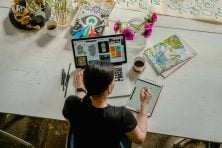Money Can’t Buy Love, but Happiness? Maybe. Here’s What One Report Says

Can money really buy happiness? Maybe.
It all depends on how much you earn — and how you spend it.
There are two steps involved in using money to buy happiness: earning enough money to cover your expenses, and spending your extra money on experiences, PayScale reports.
Step 1: Earn $75,000 or More
It’s pretty clear financial stability is a strong component of happiness, but the tipping point comes after your household begins earning $75,000, according to a 2010 Princeton study.
Earn less than $75K, and you might spend a lot of time stressed out about making ends meet.
Earn $75K or more — or whatever amount your household needs to cover its expenses and enjoy a few treats — and your next raise won’t significantly increase your happiness unless you spend the money deliberately.
Step 2: Spend on Experiences and Avoid Keeping Up With the Joneses
PayScale suggests you can maximize your money-related happiness by spending your extra cash on experiences — not things.
New experiences, such as taking a vacation or picking up a hobby, create happiness — both in the moment and in the continued form of new memories, skills and strengthened relationships with loved ones.
What Shouldn’t You Spend Your Money On?
Keeping up with your friends and peers.
If you compare yourself to the people around you, you might start to think you need a better car or bigger house. You’ll spend money on items you don’t truly value.
This includes comparing yourself to other people’s Facebook and Instagram posts.
Some of us feel dissatisfied with our own life after seeing our friends’ photos — not to mention social media’s constant advertising. It creates the urge to buy more things we don’t really need.
What Does PayScale Advise?
“The focus should be on what happiness and success look like for you, not what it looks like for everyone else.”
Want to know more? Read the full story at PayScale.
Your Turn: Do you believe money can buy happiness?
Nicole Dieker is a freelance writer focusing on personal finance and personal stories. Her work has appeared in The Billfold, The Toast, Yearbook Office, The Write Life and Boing Boing.
















